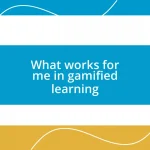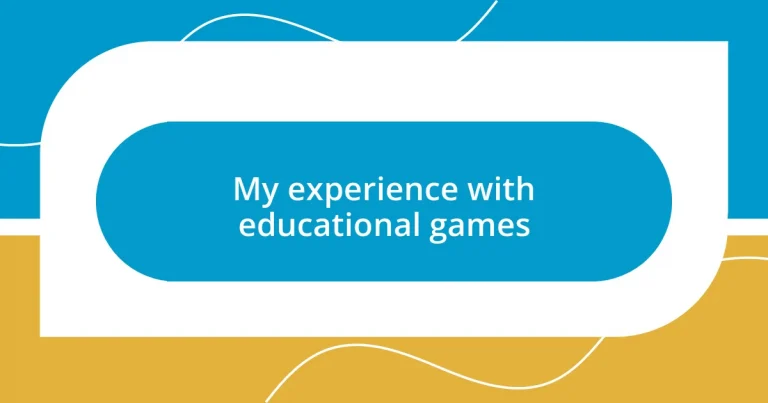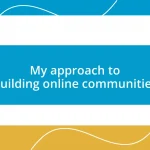Key takeaways:
- Educational games enhance learning by creating immersive environments, adapting to various learning styles, and making complex concepts engaging and memorable.
- They promote essential skills such as problem-solving, perseverance, and social interaction, fostering a collaborative learning community.
- Successful implementation of educational games requires clear learning objectives, student engagement in game selection, and post-game reflection to reinforce learning outcomes.
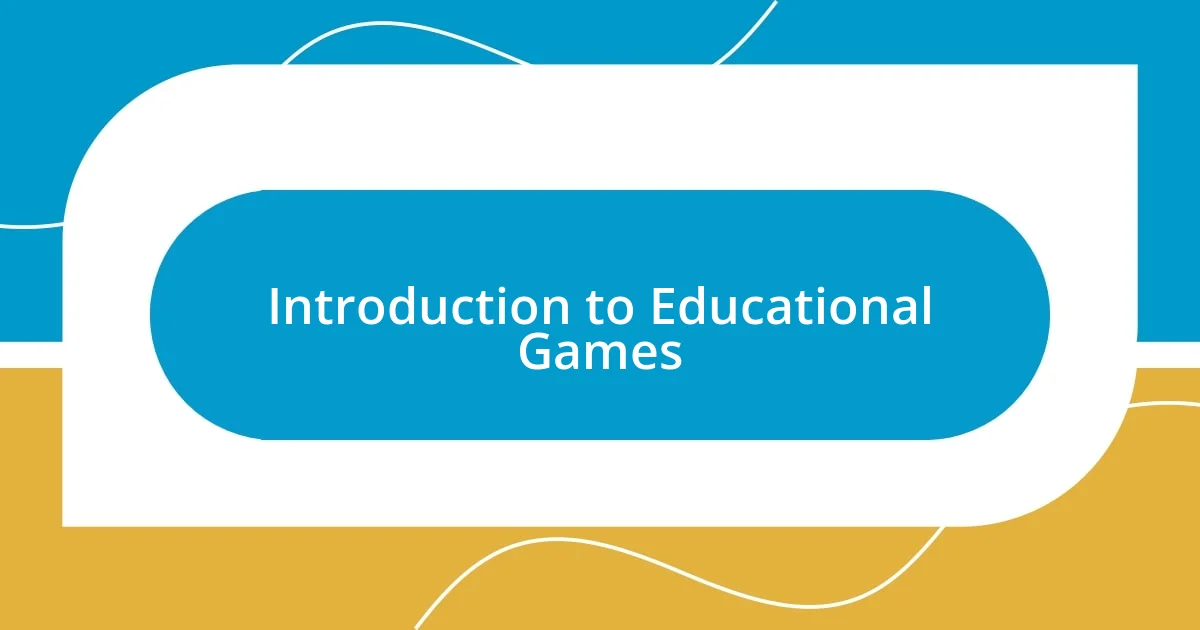
Introduction to Educational Games
Educational games have become a vibrant part of modern learning, blending fun with valuable knowledge. I remember the first time I stumbled upon a math game that transformed my struggles with numbers into a captivating adventure. It made me wonder: how can something so playful hold the power to engage young minds?
These games often create an immersive environment, allowing players to learn through exploration and interaction. I recall a science-based simulation that had me experimenting with ecosystems. It was exhilarating to see the impact of my choices, making the learning process dynamic and memorable. Wouldn’t you agree that hands-on experiences can often teach us more than traditional methods?
Moreover, educational games adapt to different learning styles, catering to a broad range of learners. During my time as a tutor, I witnessed firsthand how a visually engaging game helped a struggling student grasp concepts he once found daunting. It just goes to show that when learning is infused with creativity and challenge, it sparks curiosity and fosters a love for knowledge.
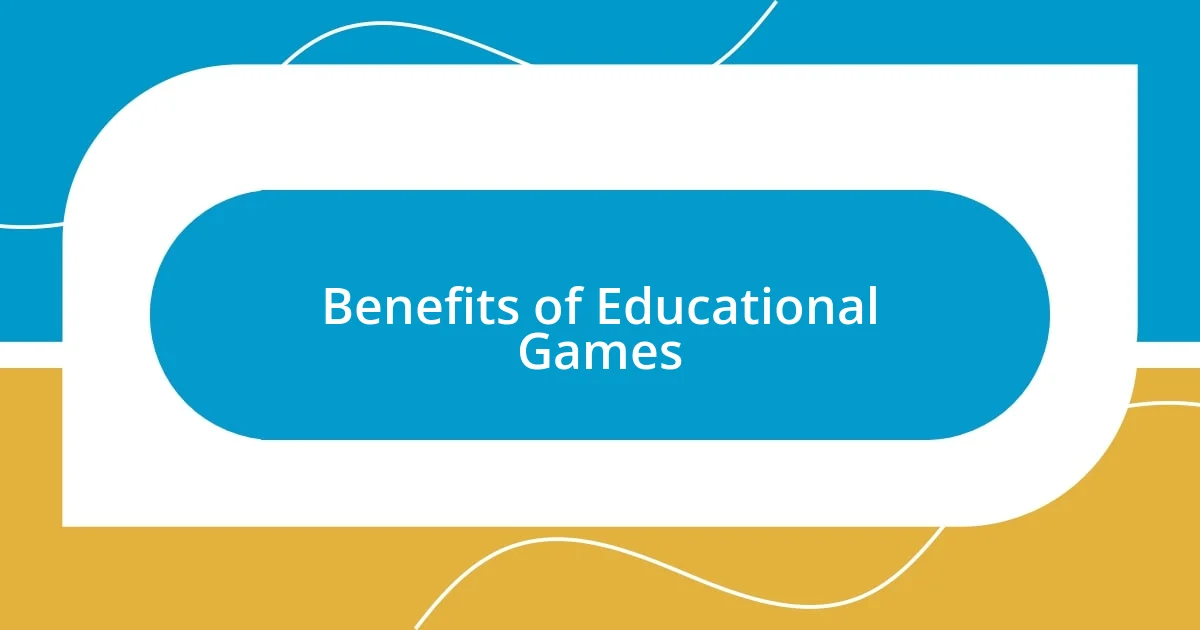
Benefits of Educational Games
Educational games offer a unique way to enhance problem-solving skills. I still remember a puzzle game that required strategic thinking to advance to the next level. The thrill of figuring out the right moves was not just fun; it sharpened my mental agility in real life too. This blend of play and learning allows for a deeper understanding of complex concepts, transforming challenges into engaging opportunities.
Another remarkable benefit is that these games promote perseverance and resilience. I observed this in my younger cousin, who would often get frustrated with difficult tasks. However, when faced with a challenging game, he would retry multiple times until he succeeded. This experience not only built his confidence but also instilled a sense of accomplishment—a crucial lesson that extends beyond the gaming screen.
Furthermore, educational games foster social interaction and collaboration. In team-based games, players learn to communicate and work together, which is essential in our interconnected world. I experienced this firsthand during a cooperative science game night with friends. Sharing insights and brainstorming strategies made the learning process enjoyable and enriched our relationships. Ultimately, educational games can create a community of learners, encouraging teamwork and enhancing social skills.
| Benefits | Explanation |
|---|---|
| Enhances Problem-Solving Skills | Engaging challenges encourage strategic thinking and mental agility. |
| Promotes Perseverance | Players learn resilience by facing and overcoming difficult tasks. |
| Fosters Social Interaction | Team-based games enhance communication and teamwork skills. |
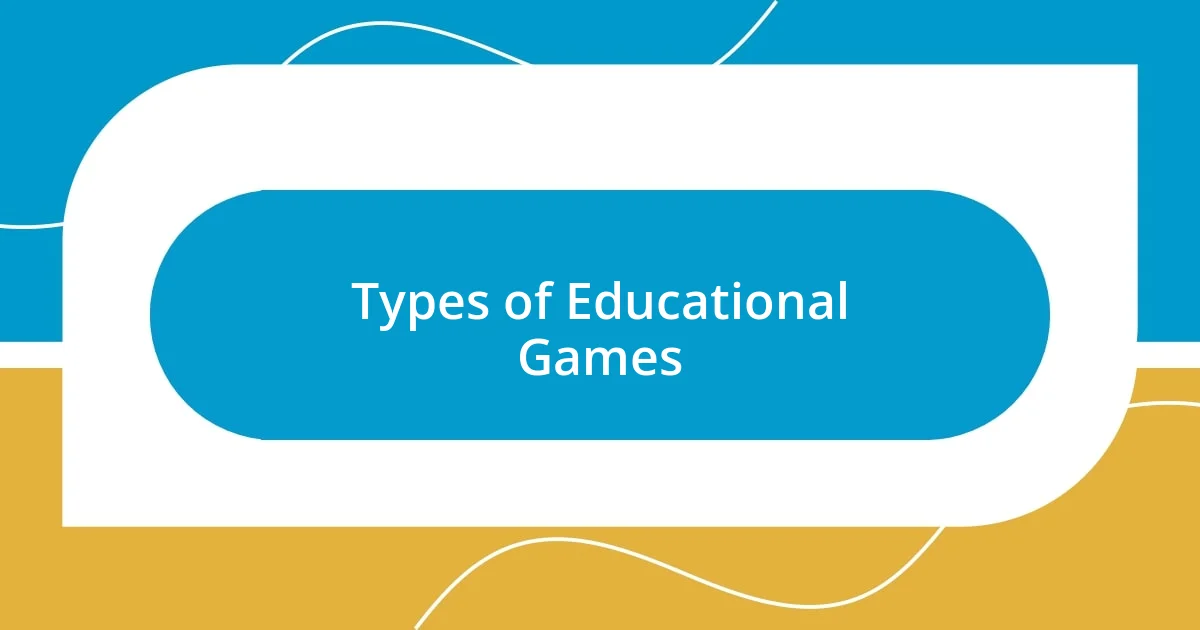
Types of Educational Games
Types of Educational Games
Diving into the world of educational games, I’ve encountered various types that cater to different subjects and learning styles. One standout moment for me was playing a language-learning game that transformed vocabulary building into a fun challenge. I found myself racing against the clock, which made memorizing new words not just effective but exciting.
Here’s a quick overview of some popular types of educational games:
- Puzzle Games: These focus on logic and critical thinking. I recall spending hours solving Sudoku puzzles, which not only entertained me but also sharpened my reasoning skills.
- Simulation Games: These mimic real-life scenarios, like virtual labs for science experiments. I vividly remember experimenting with weather patterns in a simulation; it felt like being a scientist without leaving my room!
- Trivia Games: Often competitive, they test knowledge across various subjects. I loved playing trivia with friends, igniting friendly debates and revealing obscure facts.
- Role-playing Games (RPGs): These allow players to assume characters and complete tasks, which can be particularly engaging. I once participated in a history RPG where I embodied a historical figure, making history feel alive and personal.
This variety not only keeps learning fresh but also caters to our individual preferences and strengths. I believe that by exploring these different types of games, we can discover what resonates most with us while making the learning experience enjoyable.
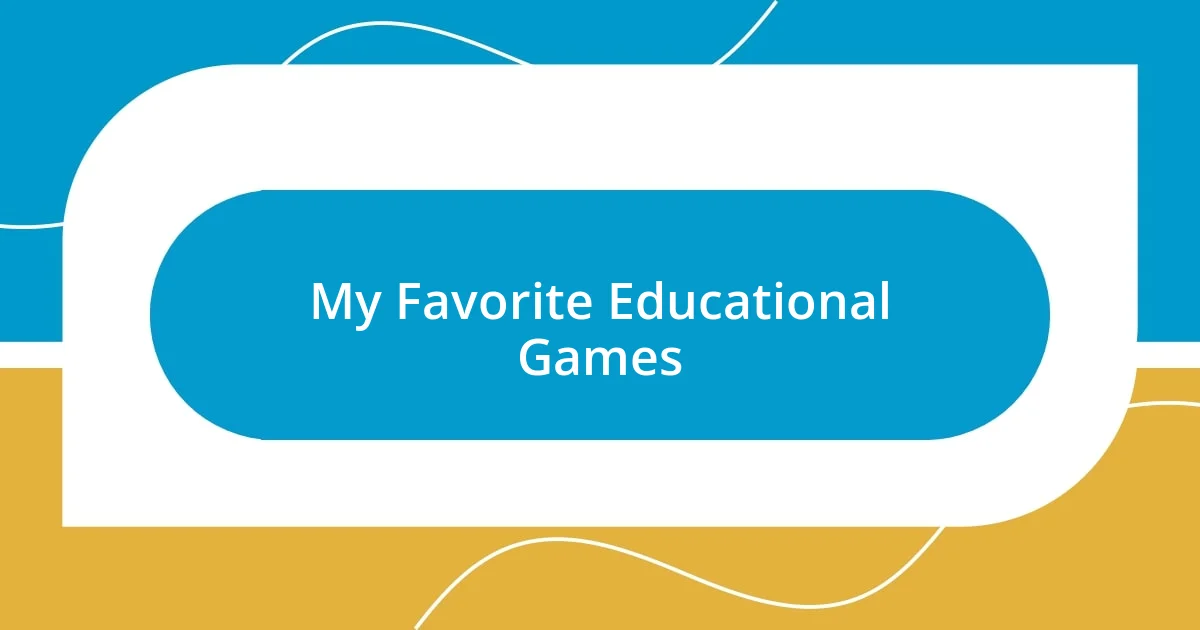
My Favorite Educational Games
One of my all-time favorites has to be Scrabble! The way it blends strategy with vocabulary makes every game a thrilling challenge. I still remember the exhilaration of laying down a long word across a triple-word score. It’s not just about winning; it’s about learning new words while having fun with friends, and I must admit, it has significantly enriched my vocabulary.
*Minecraft: Education Edition* is another shining star in my collection of educational games. I was initially drawn to its open-world environment, but I soon realized how it enhances creativity and teamwork. Collaborating with classmates to build historical landmarks was such a rewarding experience. Having to discuss designs and share resources to create something together taught us lessons about collaboration and history in vivid detail. It felt like we were not just playing, but actively shaping our learning.
And let’s not forget *Kahoot!* — a game that transforms quizzes into an exhilarating race. I can’t tell you how many times I’ve burst out laughing at friends’ faces when they rush to answer. The excitement of competing and the rush of seeing our scores, all while reinforcing knowledge, is something I cherish. It makes learning vital information engaging and memorable. What about you? Have you ever felt that electric energy in a quiz setting? It’s a feeling like no other!
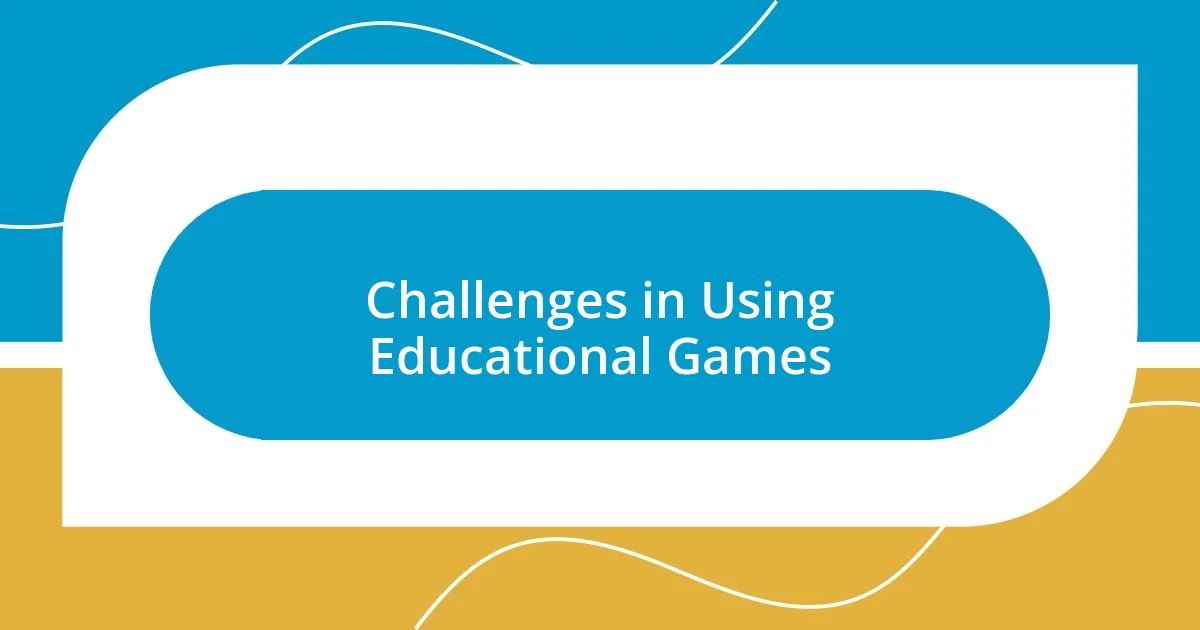
Challenges in Using Educational Games
Using educational games can be a double-edged sword. For instance, during a recent project, I encountered difficulty when some students became overly focused on winning rather than learning. It made me wonder: how can we strike a balance between competition and education? It’s a constant battle to keep the educational value at the forefront while still fostering an enjoyable experience.
Another challenge I’ve faced is the technology itself. I remember a day when our plans for a gamified lesson fell apart due to connectivity issues. Those moments can be so frustrating! It highlights the importance of having reliable tech and backup plans, ensuring that the game enhances learning rather than becoming a barrier.
Lastly, there’s the risk of misalignment between games and learning objectives. I once introduced a game that was wildly popular but didn’t quite fit with what I aimed to teach. While it was fun, I found it lacking in educational depth. So, how do we ensure our choices are both engaging and relevant? Tailoring game selection to specific learning goals is crucial, but it requires thoughtful consideration and planning.
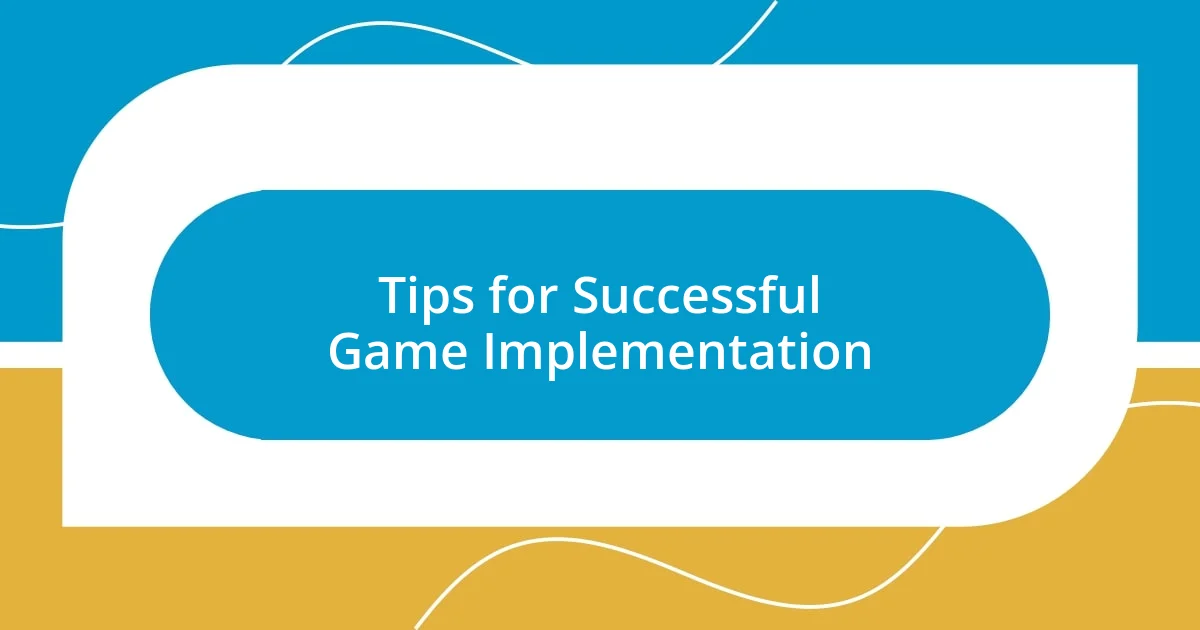
Tips for Successful Game Implementation
When implementing educational games, it’s vital to set clear learning objectives from the start. I recall a workshop where we brainstormed game ideas without defining our goals first. The result? We had a blast, but the learning outcomes were fuzzy at best. Establishing purpose not only guides the selection of games but helps maintain focus during play. Have you ever played a game that taught you something unexpected? That’s the kind of enriching experience I aim for every time.
Another crucial tip is to engage students in the process. For one project, I invited my students to suggest games that they found intriguing. The excitement was palpable! This not only made them feel involved but also ensured the games were relatable. When students have a say, it fosters a sense of ownership over their learning. I’ve found that when students are stakeholders in their educational experience, they tend to be much more invested in the outcomes.
Lastly, consider the importance of reflection after gameplay. I remember wrapping up a gaming session and asking my students what they enjoyed and learned. Their insights were often surprising and highlighted aspects I hadn’t fully appreciated. Reflection not only reinforces learning but encourages critical thinking. How often do we pause to understand what we truly gained from an experience? Incorporating debrief sessions is a simple yet effective way to enrich the educational journey through games.









